
From playing Bahadur Shah Zafar in a school drama, to starring in as well as directing plays, Vishal Sharma has made a mark in Delhi’s theatre scene.
Sharma is now all set to bring back one of the earlier productions of his own Nabhya Theatre group to the Capital. Aptly titled 8 Ghante, this play follows the lives of two typists in Connaught Place who grow old together while typing addresses on postcards in their 9-to-5 jobs. Based in the time period 1962–92, the play can perhaps be best described as a time lapse of 30 years of their lives, as they evolve along with the Capital.
Patriot catches up with Sharma as he shares his experience in working across different platforms and his take on Delhi’s theatre scene.
Can you tell us a little about your play 8 Ghante?
It’s a story about two people and their journey over 30 years: How they evolve and survive in a low-paying job in Delhi. While one is married, the other is a bachelor. Their relationship changes over a period of time and they fear losing their jobs as they grow older. It covers the complete eight-hour period, the time people usually spend in their office.
How were you introduced to the world of theatre?
It started when I was in school. I performed in a drama where I played the role of Bahadur Shah Zafar. My Hindi teacher told me that I am quite good at it but I didn’t pay much attention. I shied away from telling my family about my interest in acting and took up a job in a media company. In office, my seniors asked me to give it a try and I started pursuing theatre. Initially I treated it as just my hobby and continued with my job. But after a few years, I took it up full time and now I am in theatre for the past 12 years starting from 2007. And I also started my own group — Nabhya Theatre in 2013.
Since you have worked in TV as well as films, how different is it when you compare it with theatre?
Theatre lets you observe and feel more. For films, you can take many shots if it doesn’t come right or if the feel is missing. Since that’s not an option on stage, theatre allows us to put our brains and emotions to better use.
It also allows me to explore different characters and roles that go beyond any age bar or even gender. For example, I can step into the role of a child or an old man or even play the part of a woman, for that matter. Theatre allows it all. It gives me more opportunity to find myself. In Indian cinema, this doesn’t really happen so quickly.
Working across all these three mediums, which one do you enjoy the most?
Definitely theatre. Despite financial constraints and the far reach of cinema which does help in creating a popular identity, I believe that I couldn’t have performed well in front of the camera had it not been for theatre.
Coming back to your play, what was the reason behind setting it in Connaught Place?
CP is the heart of the city. There have been several developments and evolution over the span of time. There is always some sort of construction going on there. But one thing that won’t change is that it still remains the heart of the city.
In the play they see the world through a window of a store in Connaught Place. They share their frustrations and reassure themselves that their lives carry more meaning than those of people outside.
Talking about evolution, do you think there has been any development in the theatre scene of the city as well?
Yes, there has been development in terms of new stories and content. But what I have noticed is that theatre is still not commercialised in Delhi as of yet. People want to watch it but they step back when it comes to purchasing tickets. This creates hindrances for the development of theatre which is not the case in Mumbai. It is, however, changing for the better. However, many still consider theatre as just a gateway to films.
As a theatre practitioner what do you think is the biggest challenge in theatre in Delhi?
Survival. Despite putting a lot of effort, the budget mostly falls short and it becomes difficult to survive. That is the biggest challenge.
Since you have conducted workshops as well, what message do you have for the young budding theatre artists?
If you want to pursue theatre, complete your education first. People have this idea that they would come into theatre and become a hero, so studies are not important. But I feel that theatre requires a lot of understanding and knowledge which cannot come without proper education.
The play will be performed in LTG Auditorium on August 11
The data further shows that in the west district, around 13.3 lakh ABHA accounts are…
Traffic diversions and restrictions will be in place in central Delhi on Sunday for the…
The weather department has predicted strong surface winds during the day, with the maximum temperature…
As thousands stream into AIIMS every day, crowds, conflicts and crises are quietly managed by…
Delhi CM Rekha Gupta said the mid-day meal scheme has connected millions of children to…
The Grammy-winning flutist, Rakesh Chaurasia, reflects on legacy, collaboration and the emotional dialogue between music…